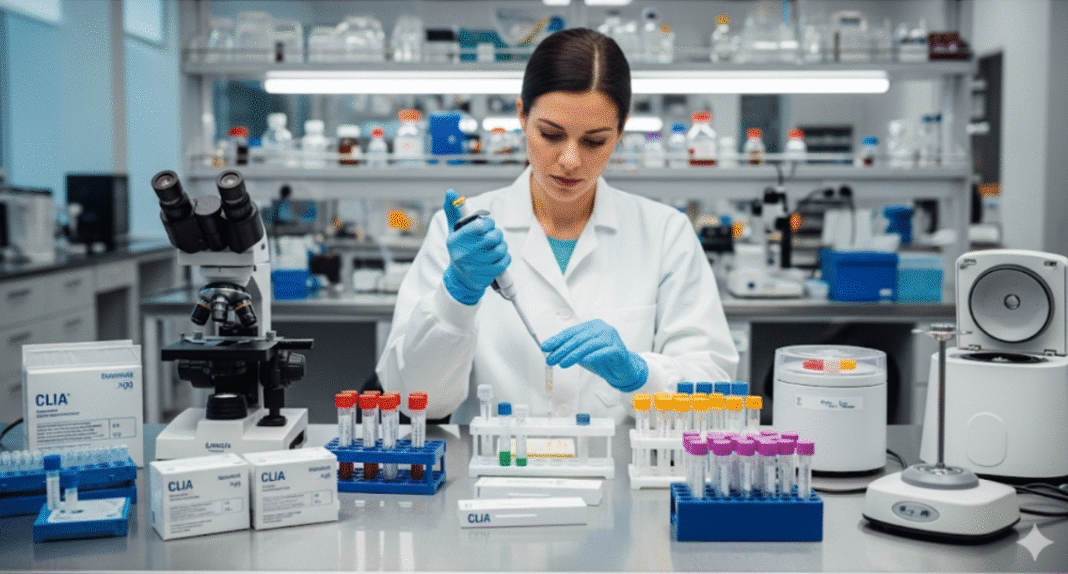CLIA stands for Clinical Laboratory Improvement Amendments, which is a US federal program. The government establishes the rules for this program to ensure that clinical laboratories provide reliable and accurate results. Doctors need accurate results to give the proper treatment to patients. CLIA needs laboratories to meet high standards for quality and accurate testing.
One critical way to ensure standardization is through the use of CLIA (Chemiluminescent Immunoassay) kits. They help enhance diagnostic testing in clinical settings. CLIA kits are specially designed to follow these guidelines, ensuring that tests are performed correctly in laboratories.
What are CLIA Kits?
CLIA kits stand for Chemiluminescence Immunoassay kits, and at core they are diagnostic tools that integrate a chemiluminescent reaction with an immunoassay to detect and measure specific substances (analytes) in a sample, such as blood or urine. These kits are utilized in medical labs.
Components of the CLIA kit:
- Biotinylated detection antibodies
- Standards and Diluents
- Pre-coated Microplate
- Wash Buffer
- Avidin-Horseradish Peroxidase (HRP)
- Chemiluminescent substrate
Why is Accuracy in Diagnostics Essential?
Accurate diagnosis plays a vital role in the medical field. It is just not a technical requirement; it is a matter of life and death. A slight delay in diagnosis or misdiagnosis can lead to numerous unnecessary treatments and ineffective therapies. Inaccurate test results contribute to increased healthcare costs and risks to patients’ health.
Laboratories must rely on the tools that are not only precise but also standardized and reliable. This is where CLIA guidelines ensure that the kits used in diagnostics meet high standards.
How CLIA Kits Ensure Accurate Diagnostics
-
A Clear Guide to Procedures
The main advantage of CLIA kits is that they simplify the testing process. Every test inside a CLIA kit is officially approved to make sure that it is thoroughly validated. These tests go through multiple phases of development and are reviewed by both regulatory authorities and manufacturers.
It’s not just the kits themselves that are standardized, but also the lab personnel. They are all trained to perform tests using the same methods, which guarantees consistent results across different labs.
-
Quality Control and Assurance
CLIA-certified labs follow a very strict set of rules to make sure every test is accurate and reliable. They have special checks in place at every step of the process.
- Every single part of the procedure is monitored, from the machine they are using to the chemicals they work with.
- Laboratory professionals are regularly tested on their skills to ensure they remain knowledgeable and can consistently perform their jobs correctly.
- If there is a slight change in the results that does not align with expectations, it is reviewed and flagged. So that potential issues can be fixed right away before they can affect a patient.
-
Sensitivity and Specificity
- Accuracy in diagnostics relies on a test’s ability to find a condition when it’s present (sensitivity) and correctly rule it out when it’s not (specificity).
- CLIA kits are designed to have high sensitivity and specificity to reduce the chances of incorrect results.
- This is especially important for tests for diseases like cancer or infectious diseases, where a wrong result could lead to a missed diagnosis or unnecessary treatment.
-
Tracking Every Step
- An approved kit comes with a complete guide that proves it is safe and trustworthy. This includes details on how it was checked, how to use it, and any warnings.
- Every test result from these kits has a complete history. We can trace it back to the exact chemicals, machines, and steps used to perform the test.
- This is a helpful way to identify the source of an error if one occurs, whether it was due to the kit, the lab, or a person who made a mistake.
-
Rapid Testing and Reliable Results
- Several CLIA-certified kits are designed to offer fast results without compromising accuracy, which is important in emergency situations to save lives.
- For example, during the COVID-19 pandemic, these kits were crucial for providing rapid and reliable test results.
Final Thoughts
In the healthcare field, CLIA kits are essential for accurate and reliable diagnostic testing. These kits help prevent mistakes and optimize patient care. CLIA kits help doctors provide faster and more accurate results. With the help of CLIA kits, we can be sure of the test results are trustworthy and precise.










